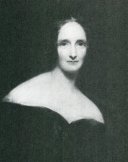
Mary Wollstonecraft Shelley (1797-1851)
Mary is born in Somers Town, Great Britain, in 1797 to well-known parents: author and feminist Mary Wollstonecraft and philosopher William Godwin. Unfortunately, Wollstonecraft dies as the result of Mary's birth. Mary is therefore raised by her father and a much resented stepmother.
When Mary is sixteen she meets the young poet Percy Bysshe Shelley, a devotee of her father's teachings. Together with Mary's stepsister, they run off to continental Europe several times, not hindered by the fact that Shelley was already married.
In 1816, they go abroad again, this time spending time with Byron and his friend Polidori in Geneva. There Byron suggests that they should all write a ghost story. Mary writes Frankenstein, the only story of the four that was ever to be published as a novel. Later that same year, Percy's wife drowns herself: Percy and Mary marry in December 1816.
The last years of married life are filled with disaster for Mary. Her half sister dies as do two of her children. Mary becomes depressed, a tendency she probably inherited from her mother. She is only partly relieved by the birth of Percy, their only surviving child.
Mary and Percy eventually move to Italy where Percy drowns during a sailing trip in 1822. Mary is determined to keep the memory of her late husband alive. She publishes several editions of Percy's writings and adds notes and prefaces to them.
She also continues writing her own novels, the most famous one being The Last Man (1826). This book deals with human isolation just as her earlier novel Frankenstein did. She writes numerous short stories and contributes biographical and critical studies to the Cabinet Cyclopædia.
Mary spends the last years of her life in the loving company of her son and two good friends. She tries very hard to free herself from the strains put on her by being the daughter and wife of such well-known people. She maintains her liberal opinions but at the same time tries to fit into a more conservative society. She even writes an apologia in her journal, which reveals "the stresses of a life spent trying to measure up to the example, yet to escape the obloquy, of her parents and husband."1
Mary Wollstonecraft Shelley dies in 1851 at the age of fifty-three.
Sources:
- Abrams, M.H., ed. The Norton Anthology of English Literature. 6th ed. Vol. 2. New York: Norton, 1993.
- Spark, Muriel. Mary Shelley. New York: Meridian, 1988.
Footnotes:
1 "Mary Wollstonecraft Shelley", The Norton Anthology of English Literature, ed. M.H. Abrams, 6th ed., vol. 2 (New York: Norton, 1993). 844-862.